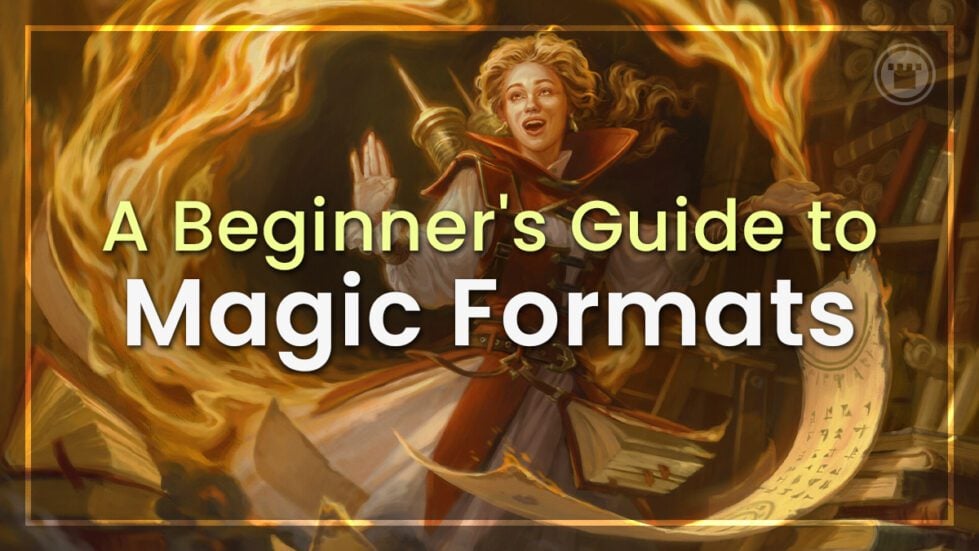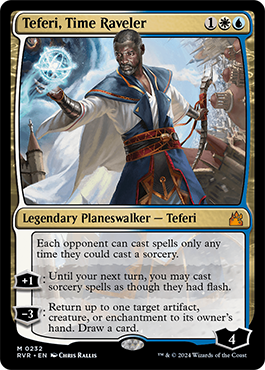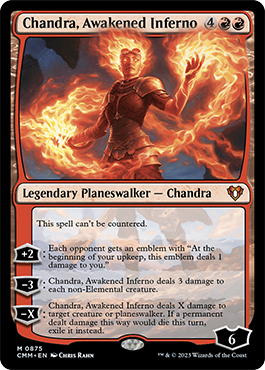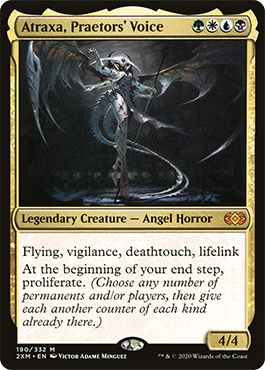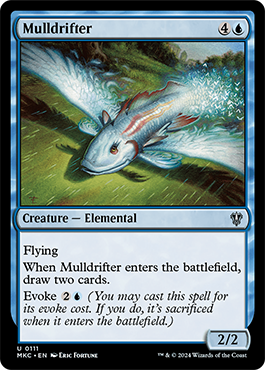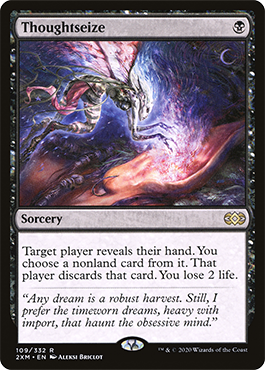There are a lot of different ways to play Magic. Each format has its own deckbuilding requirements and expects players to invest different amounts of time and money into preparing for and playing Magic. As a result, some formats appeal more to new players, and some to more experienced players. This article will go through the most popular Magic formats and suggest some that are good for new players, as well as some that you might want to wait to try.
Beginner-Friendly Formats
Constructed Formats
Standard and Brawl are Constructed formats, meaning that players bring their own decks to events, as opposed to building them as part of the event. Both formats use 60-card decks that only contain cards from the most recent five to eight Magic expansion sets.
In Standard, you can use up to four copies of any card, excluding basic lands, in a single deck. It’s always played one-on-one, and it’s often played at a competitive level. Depending on your play group, you might have opportunities to personalize your deck, or you might be expected to optimize it for competitive play. Right now, there are no cards banned in Standard.
In Brawl, you can only use one of each card excluding basic lands, and one of those cards must be a commander: a legendary creature or planeswalker that sits outside the deck and can be cast at any time. The commander’s mechanical identity determines what other kinds of cards you can include in your deck. Brawl can be played either one-on-one or in multiplayer games; it tends to be more casual than Standard and has more room for players to personalize their decks. Brawl has a different banned list than Standard, but currently the only banned card is Sorcerous Spyglass, which will leave Standard in October.
Standard and Brawl are good formats for new Magic players because they have the lowest barrier to entry. Preconstructed Standard decks themed around recent sets are available for purchase, and there will also be preconstructed Brawl decks on sale beginning with the release of Throne of Eldraine. Since entry fees are usually lower for events where players bring their own decks, a Standard or Brawl deck is basically a one-time purchase. Standard is also playable for free on Magic: the Gathering Arena, and Brawl will be available on Arena after the release of Throne of Eldraine.
Limited Formats
Sealed and Booster Draft are Limited formats, meaning that players buy Magic booster packs at the start of an event and build their decks from the cards in those packs. In Sealed, you get six boosters and can use any of the cards they contain. In Draft, each player starts with three packs, which are passed around the table with players taking one card at a time. In both formats, you can add basic lands to your deck for a total of 40 cards.
Sealed and Draft are more complicated than Standard and Brawl, because they require players to evaluate cards and build their decks under time pressure. In addition, Sealed and Draft events have higher entry fees than other Magic events. You’re paying for the packs every time, so costs can add up quickly. But if you can afford it, going to Sealed and Draft events are a great way to build up a collection of current cards that can then be useful in Standard or Brawl. There are also some smaller-scale Limited formats, such as Mini-Masters, that use fewer packs at a time and can be less stressful when you’re learning to build Limited decks.
Next Steps
Commander and Oathbreaker
Commander and Oathbreaker are Constructed formats that use cards from the entire history of Magic. Like Brawl, decks for each of these formats can only include one copy of a card, excluding basic lands. They also both use commanders.
In Commander, a deck must have a legendary creature as its commander. Decks have 100 cards, including the commander. This is usually a casual multiplayer format in which only a few cards are banned, but there is also a competitive one-on-one version.
In Oathbreaker, commanders must be planeswalkers. Decks have 60 cards, including the commander and their Signature Spell, an instant or sorcery that sits outside the deck with the commander and can only be cast when its commander is on the battlefield. Oathbreaker is not yet officially supported by Wizards of the Coast, but its creators at Weirdcards Charitable Club maintain their own ban list.
Due to their large card pools, Commander and Oathbreaker are good next steps for players who enjoy casual, multiplayer games. Building a deck from a card pool spanning the entire history of Magic requires a lot of difficult choices, especially when trying to condense that history down into a 60-card deck. And both Commander and Oathbreaker are usually played with three or more players, giving each player a lot more information to keep track of. I recommend playing some Brawl first, then converting your favorite deck into a Commander or Oathbreaker deck once you’ve gotten used to how things work.
Pauper
Pauper is a 60-card Constructed format that only allows cards of common rarity. Decks can use up to four of any card besides basic lands. Pauper is a relatively competitive format and some of the cards used in popular deck archetypes can be expensive. However, the rarity restriction makes most Pauper cards relatively affordable, so Pauper can be a good introduction to the strategies and play environment of other Constructed formats with large card pools.
Cube Draft
Cube Draft is a Limited format that’s a step up in complexity from Booster Draft. Instead of booster packs, players draft from a curated “cube” of 360 or more cards randomized into fifteen-card “boosters.” The cube’s creator determines what cards are in the cube, so cube drafts can have any level of power, intensity, and difficult decision-making. If you’re interested in cube draft, you can build your own cube from your card collection, or check out the Card Kingdom Starter Cube.
Formats for Experienced Players
“Eternal” Formats
Pioneer, Modern, Legacy, and Vintage are 60-card Constructed formats with card pools larger than Standard and Brawl. These formats tend to be very competitive, and all allow the use of powerful old cards that don’t often appear in other formats.
Pioneer has a card pool stretching back to Return to Ravnica from 2012, with a moderately-sized banlist. Every card in Pioneer went through Standard first, with no cards originating from supplementary products or sets legal in the format. Pro Tours and other major events sometimes feature Pioneer.
Modern’s card pool includes cards from Eighth Edition forward, sometimes called the “Modern” era of Magic design. It’s a common format for Pro Tours and MagicCon main events, and it has a long and controversial banlist. Most cards in Modern were legal in Standard at some point, but the recent release of Modern Horizons – a set designed for Modern that was never legal in Standard – has had a profound impact on the Modern metagame.
Legacy allows cards from the entire history of Magic, and bans some of the most powerful cards to make the format more accessible. Vintage uses the same card pool, but without the Legacy banned list. Instead, Vintage “restricts” cards, meaning that you can use one copy of that card in your deck.
Canadian Highlander
Canadian Highlander is a 100-card singleton Constructed format that uses cards from the entire history of Magic. This may sound like Commander, but if you take your Commander deck to a Highlander game you will be disappointed. Highlander is a competitive format whose decks play more like Vintage decks. There’s no ban list; instead, cards are assigned point values based on how powerful they are, and each 100-card deck can only contain ten points’ worth of cards.
If you’re interested in any of these four formats, I recommend getting some experience in competitive Standard or Pauper first to see whether you enjoy playing Magic at this more optimized level.
Play Your Way
Magic has a format for everyone, but you don’t have to play a specific format to enjoy Magic. You can build any decks you want with the cards you have, or play with preconstructed decks such as Card Kingdom Battle Decks. As long as your play group agrees on the ground rules, you can build your decks however you want. As always in Magic, the most important thing is to have fun.

Alex is an Azorius bureaucrat who dreams of joining the Selesnya Conclave. Their favorite color of mana is green, and they love brewing for Commander variants.

